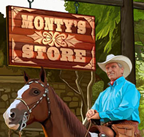My three horses are all barefoot. Our one mare has very flat front hooves with long toes and we've been working with a natural barefoot farrier to bring her toes back and help her grow her heel up. It's a long process but she is definitely making progress since we got her 3 years ago. We have a pair of renegade hoof boots that we use when traveling over rough terrain, but my daughter is now in pony club and competing in the hunter/jumper circuit where she can't wear booties.
This past week the mares have been at a training camp and the instructors husband is a farrier. They have both asked me to please put front shoes on this mare and I just don't know what to do. She's made such progress with the front feet, but it's still a work in progress and they tell me that by shoeing her it will allow her heels to grow faster...
Does anyone have any comments or suggestions? I really want to do what's best for the mare.
thanks
← back
Horse Care and Comfort
Barefoot versus shoes

Rewards
Subscribe to Equus Online University and become a part of Monty's worldwide mission to leave the world a better place for horses and for people too.
Students automatically gain access to special rewards, such as exclusive discounts at the Monty Roberts Online Shop. Visit Monty Roberts Online Shop.



I can see why the farrier would like you to put front shoes on your mare. It is going to cost you money and the farrier is going pocket it.
If the mare is not lame you do not need to put shoes on. There are things you can do to encourage her heels to grow up. You are already working with a natural barefoot farrier. She is making progress so I would stick with the program. To help her to toughen her heels up, if you can afford it, put pea size rock gravel in her paddock.
I believe that barefoot is best for your mare.
You could always get a second opinion from another qualified person. But remember, she's your horse and if you don't feel it's right to put shoes on and you trust your barefoot farrier, you may just have to politely tell these people that you have a different opinion, and that while you value their input you would prefer to allow her heels to grow naturally.
Would your mare move more freely with her boots on Iclark? If so, there is one alternative to have the boots on while riding. You find very good information about the hoof and how it grows on youtube actually - every horse is individual, and just like the hairdresser, every ferrier has their own speciality! Try to get as much knowledge your self and it might be easier for you to have discussions with ferriers, it is like a jungle, but you will get it! Good Luck! Warmest Ann
I have had horses for years, and never had shoes on any of them. Recently I asked our farrier if we should get shoes on Emmett and Princess, and he said not unless we are planning on riding on the road or over rocks a lot. I was especially concerned about Princess, since she has white hooves, and I have heard that they are softer, but he said no, they really arent, not usually, hers are fine. He said he would shoe them if we wanted him to, but it wasnt really necessary and would just be an unnecessary expense.
I have just read Monty's article on the "Advantages of going bar". If she is not lame then there would appear no reason to put shoes on.
Oops "bare" not bar
I am really interested in this. I have a 7 year old quarter horse gelding, who has had a crack in his hoof for 3 years. We got 3 different farriers out to look at his feet and all 3 told us he'd have to have shoes and probably need them forever. Recently, I found a barefoot specialist to come out and look at him. She removed the shoes and showed the damage that was done to his feet. The minute the first shoe came off an intensive relief look came over him and he started to lick and chew and his eyes softened. It will take 6-8 months to undo the damage of the shoes and he will need to be checked every 3-4 weeks. But if that crack finally grows out it will be such a relief. I just feel bad that we didn't take them off sooner.
I have been riding and working for 7 years and just recently stumbled across all of the health benefits of going barefoot. I believe it is the best and healthiest choice for all horses. We recently took my 12 year old quarter horse barefoot and he is doing great! It is sad to see so many people at my barn that haven't done the research and think all horses need shoes. Some actually believe shoes are healthier. The farrier at the barn is the owners brother so every horse exept the ponies have shoes. I was told by many people that he is going to fail and that it is stupid to go barefoot and am often asked by my friends why I wen't against everyones advice. I try not to make it sound like shoes are so terrible because I don't want the owner to get mad but when I look at their horses feet they are cracked and chipped and growing lop sided and then I look back at Wickles' feet they are neat and healthy. When people ask I always tell them I think barefoot is better and I have actually seen an improvement in his performance. We have hired a perfessional barefoot trimmer and Wickles is going strong. I believe ot is right to keep your horse barefoot Iclark. Good luck to you all.
I have a 5 year British warmblood he has never had shoes on and I intend to keep him that way, even though he has shallow feet and soft soles, and are English wet weather is not helping this problem and a lot of people on our yard keep advising me to get him shod, I recently bought the cacao boots with Pasternak wraps and gell pads and he is going so well he even seems to look forward to having them on especially when we are going on rough ground, so until such time that he is not happy I will continue bare foot.
My old farrier always said that the worst thing you can do is put shoes on a horse for the first time.
Had oscars feet done today have chosen to keep him barefoot and the farrier is helping to right a slightly turnd out left hoof {his mums front hoof was very turnd} today in training oscar was great moving one way but when it comes to having the problem hoof to the inside he seems to play up and i know that they are different on each leg {Somtimes} but also he played up when having his opposit front right hoof trimed im wondering if this might be a balance issue oscar was fine when all other hoofs were trimmed only when baring weight on the slight turnd hoof are their any other sighns i can look for to see if there is an issue or is he just being a 2year old?
Ooh loving this thread! I've had both barefoot and shod horses and have always had a gut feeling that barefoot was better. Off to do some more research and see if there are any barefoot farriers in my area :)
Hi Rahni, look for The Hoof Smith, Sydney Barefoot Centre they should be able to help locate a farrier in your area. My 3 horses are all barefoot 3 years now. My mare has very flat hooves and navicular disease which the farrier, vet and I are slowly but surely winning the battle to correct(she had this when she was given to me.) She also had very soft feet to start with but with access to a range of ground from soft pasture to rocky bush trails her feet have slowly hardened up to the point where she will happily walk across our creek crossing now. Mind you this has taken 3 years for her and if she is to be ridden on any surface other than soft pasture she will have to wear boots. Something else I found incredibly helpful when my mare Lucy injured her hooves was a sandpit stable. I built a stable and filled the bottom to a good depth with course river sand. It gave her great releif just being able to take the pressure off her feet. It made changing dressings on her feet much easier for me as she was much more comfortable. Lucy still gets the occaisonal stone bruises on her heel which sometime lead to abscesses so when this happens I put her in the sandpit for 1 or 2 days/night and it seems to stop the abscessing. I don't know if this is helpful but thought I would share. All the best
Thank you Sam! I did a google search before, but could only find ones outside my area. I'll let you know how I go.
Really interesting to read about your experience with the sand stable :)
With navicular disease. I had only heard a little about it and was told prognosis was always grim. So great to hear positive stories!
Hi Sam how much sand are you talking about? six inches twelve inches? Do you cover the entire stall as in 12 x 24 or 24 x 24 stalls? Thank you sounds like great advise. I have a mustang and she has great feet but my miniature sometimes seems sore. And advise there? Both are barefoot.